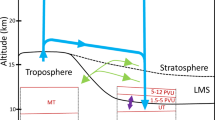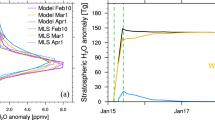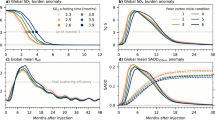Abstract
Recent measurements of enhanced ozone depletion in springtime in the Antarctic circumpolar vortex1 were accompanied by observations of unusual behaviour of stratospheric aerosol2. Enhanced concentrations of condensation nuclei (CN) were observed above 20km. Some photochemical models predict elevated hydroxyl radical (OH) concentrations in the vortex. Here I point out that high OH concentrations provide a sufficient source of CN through reaction with carbonyl sulphide (OCS) to account for the observed increase in CN mass. Other mechanisms for CN enhancement are inconsistent with timescales or the vertical structure inferred from aerosol observations. The CN enhancement provides partial support for photochemical models of ozone depletion in the vortex.
This is a preview of subscription content, access via your institution
Access options
Subscribe to this journal
Receive 51 print issues and online access
$199.00 per year
only $3.90 per issue
Buy this article
- Purchase on Springer Link
- Instant access to full article PDF
Prices may be subject to local taxes which are calculated during checkout
Similar content being viewed by others
Author information
Authors and Affiliations
Rights and permissions
About this article
Cite this article
Oppenheimer, M. Stratospheric sulphate production and the photochemistry of teh Antartic circumpolar vortex . Nature 328, 702–704 (1987). https://doi.org/10.1038/328702a0
Received:
Accepted:
Issue Date:
DOI: https://doi.org/10.1038/328702a0
This article is cited by
-
The ozone, aerosol depletion and condensation nuclei events in the stratosphere
Advances in Atmospheric Sciences (1990)
-
The effect of nitrogen fertilization on the COS and CS2 emissions from temperature forest soils
Journal of Atmospheric Chemistry (1989)
Comments
By submitting a comment you agree to abide by our Terms and Community Guidelines. If you find something abusive or that does not comply with our terms or guidelines please flag it as inappropriate.



